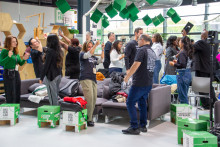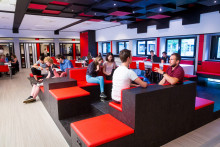The lecture was initiated by the UT´s department of Psychology, Health and Technology. As it happens, research of Positive Design done at TU Delft is closely related to research within Center for eHealth and Well-being at the UT. Both institutes base their work on positive psychology, although in a different context.
Products improving lives
Pieter Desmet is chair of Design for Experience at the Faculty Industrial Design Engineering, TU Delft, where they focus on 'designing for emotions' or, in other words, developing products that contribute to people´s happiness. Can products do that?
One product that has provably improved lives of its users is KonneKt. 'Children in hospitals, such as young oncology patients, often need to be put into isolations rooms, where they sometimes stay up to four months. They are literally isolated from the outside world by a glass barrier,' describes Desmet. 'This is of course hard for them, because contact with other people is difficult. They are children, though, and like any other children, they want to play. KonneKt allows them to do that. It´s a game that is used on the glass barrier, and therefore enables close interaction with others outside the glass wall. Watching the video of children using it, you can see how happy they are.'
25 shades of joy
Objects can evoke more than just simple pleasure. According to Prof. Desmet, there are in fact 25 different positive emotions that we can experience when interacting with a product. They range from satisfaction and fascination to hope, inspiration or sense of respect. All of these emotions can be considered when designing a product.
For example, Delft Institute of Positive Design, which Pieter Desmet cofounded, collaborated with KLM to design a crew center, which would evoke emotions such as relaxation or anticipation and put the crew into a good mood before flights, consequently improving the experience for KLM passengers.
People enjoy negative emotions
Nevertheless, it is not only positive emotions that designers should focus on. Even negative emotions contribute to our experiences being (positively) memorable. 'Every day people engage in activities that evoke negative emotions. Take video games, for example. You need to experience a certain level of frustration in order for the game to be good. We constantly experience sadness when watching movies, even romantic comedies include sad scenes. We like horror films and roller coasters - we search for fear, it excites us,' explains Desmet. 'We can therefore design for these rich experiences, such as excitement of fear.'
Let´s go back to happiness for a moment. 'What determines how happy we are? From 50% it is our genes, from 40% our activities and only from 10% it´s our circumstances, which include products. That is a bit depressing for me as a designer,' thinks Desmet. 'But I still believe that objects can help you become a better person. It´s the way we deal with circumstances, the way we interact with the objects that influences our happiness. For instance, products can provoke social interaction, which is one key element of happiness.'







